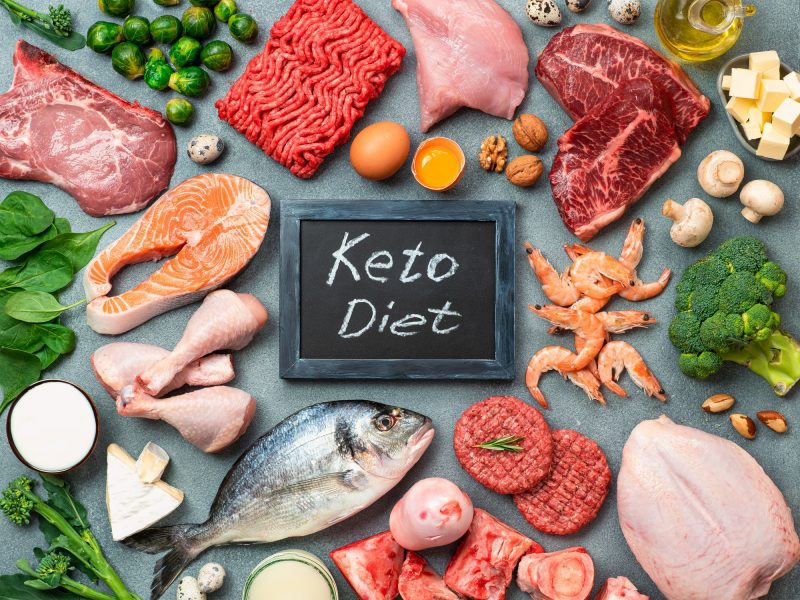In this article, you will discover:
- Keto Diet
- History of Keto
- How it works
- Benefits
- Versions of Keto
- Sample Plan for a day
- Final Verdict
WHAT IS KETO DIET?

The ketogenic diet, commonly referred to as “keto” diet is a low carbohydrate, adequate-protein, and fat-rich eating plan that was used previously to cure certain medical conditions. A ketogenic diet mimics fasting, forcing the body to burn fats instead of carbs. In this diet, the main source of energy is fat, and when it combines with low consumption of carbs, it produces ketones.
Back in the 19th century, doctors recommended the keto diet to control diabetes. In 1920, when medicines became ineffective for treating epilepsy in children, keto was proposed. When this diet became famous, it was also tested for other medical conditions including cancer, Alzheimer’s disease, diabetes, and POS (polycystic ovary syndrome).
HISTORY
In the year 1921, a famous endocrinologist, Rollin Woodyatt found out that three water-soluble compounds, acetoacetate, acetone, and β-hydroxybutyrate were produced naturally by the liver as a result of starvation or a diet that is low in carbs and high in fat. Together these three compounds are known as acetone bodies.
After a detailed study, this diet was given the name of ketogenic diet and was used in the treatment of epilepsy. In 1960s, another research was led that helped in discovering that medium-chain triglycerides (MCTs) produce more ketones because they are transported quickly to the liver through the hepatic portal vein instead of the lymphatic system.
Peter Huttenlocher, in 1971 devised a diet where 60% of the calories were coming from MCT oil. This allowed more carbohydrates and proteins to be added to the diet as opposed to the original keto diet. Afterward, several hospitals adopted this diet as well as the original keto diet for treating medical conditions.
HOW DOES KETO DIET WORK?
Are you familiar with how normal diet works? If you aren’t, let me guide you through the process. When you consume food, it is converted into glucose that is transported throughout the body so that it can be used by various cells as a source of energy. Our brain mostly relies on glucose as its energy source. But when you adopt a diet that is low in carbs, our liver starts processing fats so that it can provide our brain the necessary energy in the form of ketone bodies and fatty acids.
The amount of protein in ketogenic diet is sufficient for body repair and growth. For a regular keto diet, the ratio of fat to carbohydrates and protein is 4:1.
BENEFITS OF KETO DIET
· Aids in fighting acne: Are you tired of your fight with acne? Well, you can now reduce the chances of your acne by shifting to keto diet. Although it works for 70% of individuals, it is difficult to rely just on keto if your acne is hormonal.
· Reduces the chances of cancer: Evidence has suggested that if ketogenic diet is combined with radiation and chemotherapy, it can reduce the size of the tumor significantly.
· Weight loss: Ketogenic diet is famous for enhancing the process of losing weight. It also improves the metabolic system and has special hormones that help you feel full. It reduces your appetite and helps in maintaining the ideal BMI for your body type and height.
· Protects brain functioning: Neuroprotectivebenefits are provided when ketones are released. Ketogenic diet has proven to be beneficial in Alzheimer’s disease.
· Good for heart: Studies suggest that following ketogenic diet has been beneficial for dropping the amount of LDL or bad cholesterol, increasing HDL or good cholesterol, and reducing triglycerides.
· Helps fight Metabolic Syndrome: People who have diabetes and heart diseases often have the risk of developing metabolic syndrome. Symptoms often involve high blood pressure, high triglycerides level, high blood sugar, and obesity. Shifting to a diet that is low in carbs helps in regulating all these symptoms and also helps in losing weight.
VERSIONS OF KETO DIET
There are 4 basic versions of ketogenic diet. These versions are relatively famous. They include:
· SKD – Standard Ketogenic Diet: This type is the most famous one among other categories. It includes low carbohydrates (10%), moderate protein (20%), and high fat (70%).
· CKD – Cyclical Ketogenic Diet: This type consists of days of higher fat intake (i.e., 5 days) followed by days of high carbohydrate intake (i.e., 2 days). High carbohydrate days are often known as refeeding days.
· TKD – Targeted Ketogenic Diet: This is just like regular ketogenic diet with the exception that it allows you to add carbohydrates in your diet around workouts.This is suitable for people who work out regularly.
· High Protein Ketogenic Diet: This type adds more protein to the regular version of keto diet. Often, the ratio is 60% fats, 35% proteins, and 5% carbohydrates.
The readers need to understand that only the Standard keto diet and High-Protein keto diet have been studied in detail. Other types are more advanced and better suited for athletes and bodybuilders.
SAMPLE KETO DIET PLAN FOR A DAY
- 8 am – 1 tbsp. of apple cider vinegar with 2 sips of water
- 8:15 am – 1 glass of lukewarm water
- 9:15 am – Omelet (2 eggs), one slice of cheese, and sliced mushrooms
- 11 am – Green tea (Any)
- 1 pm – Salad (mostly greens, feta cheese, at times strawberries)
- 4 pm – Strawberries or almonds as a snack with green tea
- 7 pm – Butter chicken, keema Shimla Mirch, cottage cheese on the side, palak paneer, sometimes bhindi
- 8 pm – Green tea with 1 squeezed lemon
- Try to cook everything using desi ghee or white butter
- Important tip: Consume a total of 2-4 liters of water a day
FINAL VERDICT
All diets have potential side-effects and thus, regular monitoring and review are required by a qualified health professional. Overall, unless it involves a medical condition, you can adopt ketogenic lifestyle for a short period. When fats and carbohydrates are involved, balance is the key. The type of fat that you choose to consume and its quantity matter a lot. If you want to move towards a healthier lifestyle, you can’t cut-off carbs completely.
“At this stage, there is a lack of strong evidence for keto diets in terms of their health claims about longevity, gut microbiome, and heart health. Diets that are higher in carbs and lower in protein have the strongest links to longer lives and happy guts. Recent evidence has shown that a high-fat diet, especially a high saturated fat diet, can promote inflammation and lead to the progression of inflammatory diseases such as Alzheimer’s”. – Dietitian’s Verdict











 Restaurant Reviews
Restaurant Reviews Video Reviews
Video Reviews Kitchenware
Kitchenware